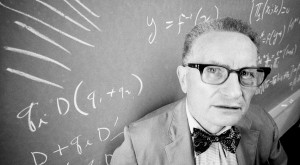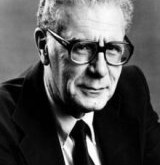Balanced budget — an old fashioned religion I think there is an element of truth in the view that the superstition that the budget must be balanced at all times [is necessary]. Once it is debunked, [it] takes away one of the bulwarks that every society must have against expenditure out of control. There must be discipline in the allocation of resources or you will have anarchistic chaos and inefficiency. And one of the functions of old fashioned religion was to scare people by sometimes...
Read More »The non-existence of economic laws
The non-existence of economic laws In methodischer Hinsicht verdankt das ökonomische Erkenntnisprogramm ohne Zweifel dem Einfluss der klassischen Physik eine wichtige Komponente, nämlich den Gedanken, dass die sozialen Phänomene ebenso von Gesetzmässigkeiten beherrscht sind wie die Naturerscheinungen und dass es daher angezeigt ist, solche Gesetzmässigkeiten zu suchen und theoretisch in ähnlicher weise zu kodifizieren, wie Newton das für die Gesetze der Mechanik in seinem System geleistet...
Read More »Think you’re rational? Better think twice!
Think you’re rational? Better think twice! My friend Ben says that on the first day he got the following sequence of Heads and Tails when tossing a coin: H H H H H H H H H H And on the second day he says that he got the following sequence: H T T H H T T H T H Which day-report makes you suspicious? Most people I ask this question says the first day-report looks suspicious. But actually both days are equally probable! Every time you toss a (fair) coin there is the same probability (50 %) of...
Read More »Dani Rodrik on behavioural challenges (VIII)
Dani Rodrik on behavioural challenges (VIII) How would you react if a renowned physicist, say Richard Feynman, was telling you that sometimes force is proportional to acceleration and at other times it is proportional to acceleration squared? I guess you would be unimpressed. But actually, what Dani Rodrik does in Economics Rules amounts to the same strange thing when it comes to theory development and model modification. In mainstream neoclassical theory preferences are standardly...
Read More »Jump
[embedded content]
Read More »O Holy Night
[embedded content] Jussi — still no. 1!
Read More »Dani Rodrik and the ’empirical turn’ in economics (VII)
Dani Rodrik and the ’empirical turn’ in economics (VII) In Economics Rules, Dani Rodrik maintains that ‘imaginative empirical methods’ — such as game theoretical applications, natural experiments, field experiments, lab experiments, RCTs — can help us to answer questions conerning the external validity of economic models. In Rodrik’s view they are more or less tests of ‘an underlying economic model’ and enable economists to make the right selection from the ever expanding ‘collection of...
Read More »Confusing mathematical masturbation with intercourse between research and reality
Confusing mathematical masturbation with intercourse between research and reality No real problem worth solving can be solved without some basic research. Therefore the engagement of faculty and students on real problems yields basic research problems whose solutions are of practical significance. Furthermore, the validity of these solutions can be tested in the most effective way known: in application. This avoids one’s confusing mathematical masturbation with intercourse between research...
Read More »Between debt and the devil
Between debt and the devil [embedded content]
Read More »Dani Rodrik on math and models (VI)
Dani Rodrik on math and models (VI) According to Dani Rodrik — as argued in Economics Rules — an economic model basically consists of ‘clearly stated assumptions and behavioral mechansisms” that easily lend themselves to mathematical treatment. Furthermore, Rodrik thinks that the usual critique against the use of mathematics in economics is wrong-headed. Math only plays an instrumental role in economic models: First, math ensures that the elements of a model … are stated clearly and are...
Read More » Lars P. Syll
Lars P. Syll







